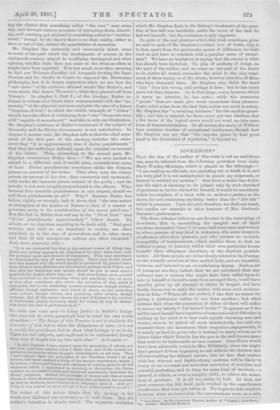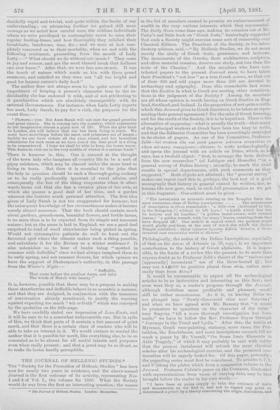LOVE-KNOTS.*
TitAl the aim of the author of this work is not an ambitious one, may be inferred from the following quotation from Lady Mary Wortley-Montagu, which is placed on the title-page :— "I am reading an idle tale, not expecting wit or truth in it, and am very glad it is not metaphysics to puzzle, my judgment, or history to mislead my opinion." And since a writer has doubt- less the right of claiming to be judged only by such standard of gooduese as he has elected for himself, it would. be manifestly unfair to complain of a book with BO modest a preface as the above, for not containing anything better than the "idle tale" which it promises. Upon the plot, therefore, we shall not touch, but confine our remarks to other features of Mrs. Gertrude Parsons'e performance.
The three volumes before us are devoted to the untwisting of lore.knots, that is, unravelling the tangled web of tepid emotions (miscalled "love ") of some half-score men and women to whom passion of any kind is unknown, who seem incapable of affection other than platonic, and who possess an enviable tranquillity of temperament, which enables them to look on without a pang of jealousy whilst their own particular lovers transfer their allegiance elsewhere, at the shortest possible notice. All these people are either closely related to the Peerage or else actually members of that exalted body, and are beautiful, virtuous, and talented to an overwhelming degree. Such a set
of paragons are they, indeed, that we are convinced that any
ordinary man or woman who might have been called upon to take to himself or herself a mate from amongst them, would have speedily given up all attempt at Choice in despair, and have finally drawn lots to settle the matter, with some such exclama- tion as this,—" Where all are perfect, I can find no reason for
giving a preference rather to one than another ; but what
matters that, when the possession of either of them will suffice to assure my felicity ? Let hazard decide !" It appears as if the author must herself have experienced some amount of difficulty in making up her mind as to how such equally charming men and women were to be paired off most satisfactorily, for until the moment when she announces their respective engagements, it is nearly as hard to guess who is destined to marry whom, as to detect under which thimble lies the pea in the well-known game
that used to be fashionable on race-courses. Love-Knots would
have been admirably suited.to Mrs. Wititterly, since she might have perused it from beginning to and without the faintest risk of over-exciting her delicate nerves; but we fear that readers with less ethereal and highly-strung systems, will be likely to weary of one constant and. unbroken succession of areadian and peaceful perfection, and to long for some kind of incident,—a. quarrel, a villain, or even a naughty child, to relieve the mono- tony of goodness. It is all too pretty by half. At first, our poor common clay .felt itself quite crushed by the superhuman excellencies that were put before it. We began to take comfort, however, when we found that the conversations were, as a rule,.
* Lstre../Cnots. By Mrs. Gertrrule Parsons, Author of "Irreala's Love-Story,' to, Loudon : attest mai Illaokett.
-decidedly vapid and trivial, and quite within the limits of our -understanding ; on advancing further we gained still more courage as we noted how careful were the sublime individuals whom we were privileged to contemplate never to miss their regular feeding-times, and how thoroughly they relished their breakfasts, luncheons, teas, &c. ; and we were at last com- pletely reassured as to their mortality, when we met with the following sentiment, proceeding from the mouth of Lady Letty :—" What should we do without our meals P They come in joy and sorrow, and are the most blessed break that dullness can ever know," After that, we were less awe-struck. It was the touch of nature which made us kin with these grand creatures, and satisfied us they were not "all too bright and
:good for human nature's daily food."
The author does not always seem to be quite aware of the importance of keeping a person's character true to the in- dividuality she has endowed it with, and of not attributing to it peculiarities which are absolutely incompatible with its -eactornal Circumstances. For instance, when Lady Lefty expects her aunt, Lady Sarah, to pay her a visit, she prepares for the event thus :— "Flowers,—yes.. But Aunt Sarah will not care for grand growths and great names. She is coming into the country,. which represents to her imagination almost a gipsy sort of life. When she gets back to London, she will believe that sun has been living in teats, We must have snowdrops before the snow, and primroses out of season ; luckily we can have violets all the year round, and her boundless admiration for such moss as we have round the deer-pond is a thing to be remembered. I hope we shall be able to keep the house warm. This desire to visit rue in the very middle or winter is a serious freak."
'There is humour in this. One is amused at the thought of the town lady who imagines all country life to be a sort of gipsy existence, which may be classed under the same head as living in tents. But then it is essential to the joke that the lady in question should be such a thorough-going cockney us to be really profoundly ignorant of rural affairs, and consequently the fun of the thing evaporates when it after- wards turns out that he has a country place of her own, at which she passes a good deal of her time, and a garden 'whereon she bestows much personal attention. The first idea given of Lady Sarah is not too exaggerated for humour, but the subsequent knowledge of her circumstances makes it become merely absurd nonsense. That the book should contain much about gardens, greenhouses, beautiful flowers, and fertile farms, is no more than is to be expected from its simple and innocent nature ; bitt as the scene is laid in England, we are a good deal aurprised to read of wood strawberries being picked in spring.
Would not consumptive patients do well to hunt out the favoured spot where the climate makes such a thing possible, and substitute it for the Riviera as a winter residence ? It also astonishes us to hear of banks being " spotted iu summer with daffodils" since we had always imagined them to be early spring, and not summer flowers, for which opinion we have the support of Shakespeare's authority, in this passage
from the Winter'a Night:—
"Daffodils, That come before the swallow dares, and take The winds of March with beauty."
It is, however, possible that there may be a purpose in making these strawberries and. daffodils behave in so eccentric a manner, and that they are designed, in conjunction with the tameness -of conversation already mentioned, to justify the warning against expecting too much "wit or frail" which was conveyed by the quotation on the title-page.
We have candidly stated our impression of Love-Knots, and it will be seen to be a somewhat unfavourable one. But in spite ef this, we think that parts of it contain a fair amount of quiet
merit, and that there is a certain class of readers who will be .able to take an interest in it. We would venture to remind the -author that it is possible for merit, like everything else, to be so concealed as to be absent for all useful intents and purposes oven when really present ; and that a jewel may be so ill-set, as to make its lustre hardly perceptible.



































 Previous page
Previous page